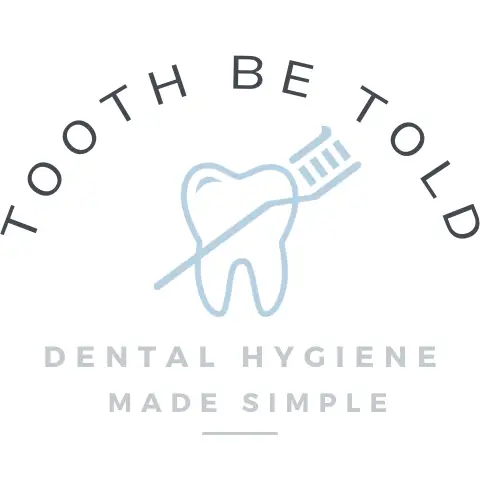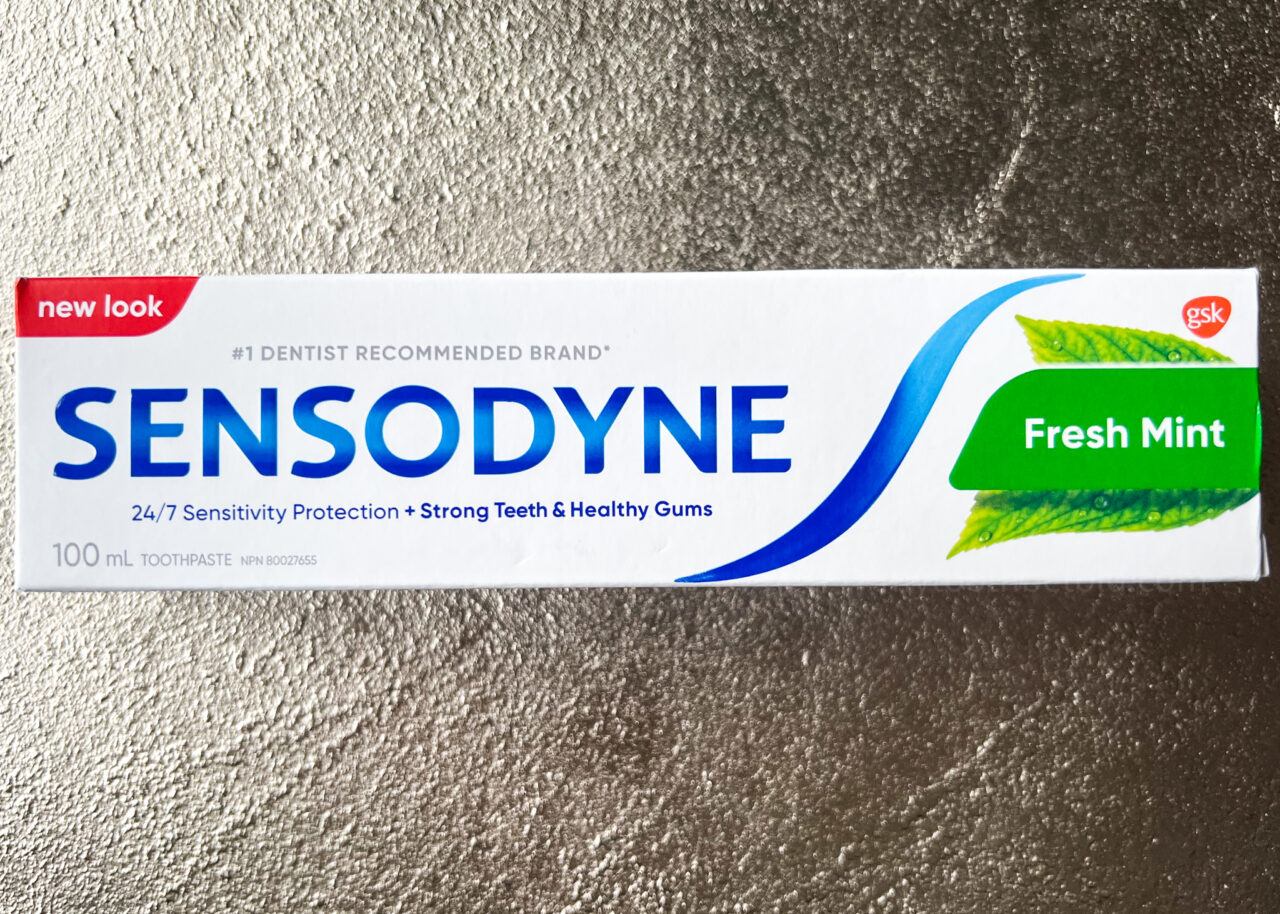
Sensitive teeth is one of the most significant complaints I hear from my patients in my dental chair. Sensitive teeth can come on quickly and have many sources, but how can you prevent tooth sensitivity naturally?
Potassium nitrate is a natural ingredient in dentifrices that blocks the nerve of the tooth from firing the pain signal to the brain, thus preventing tooth sensitivity. Good oral hygiene, regular dental hygiene appointments and preventing gingival recession also prevent sensitive teeth.
In this post, I explain why “naturally” doesn’t always mean without side effects, and the 12 ways to prevent tooth sensitivity, including interventions by dental professionals, the causes of tooth sensitivity, including internal and external causes, and if clove oil or salt water help reduce tooth sensitivity.
It is crucial to have a complete exam by a dental professional if you are experiencing tooth sensitivity, and please don’t rely solely on information found on the internet.
Nothing beats an in-person/physical exam because each case is unique to the person, and their current medical conditions, medications, supplements, and potential risk factors and causes of tooth sensitivity need to be investigated.
How to prevent tooth sensitivity “naturally”; different types of tooth sensitivity
I want to start by saying that the word “natural” or “naturally” does not have a clear definition in the medical world. Even in the food industry, the term natural is not regulated.
There is a lot of “grey area” around the word natural, which can mean multiple things, and being “natural” does not mean that there are no harmful side effects or consequences to using them.
So even though the word natural is used, it does not mean that it is safe to use, such as some suggestions to use clove oil or salt water to reduce tooth sensitivity (which I dive deeper into further along in this post)
And “natural” medicines, contrary to what many may think, are not without side effects. Some can even have serious safety concerns.
https://www.nccih.nih.gov/health/know-science/natural-doesnt-mean-better
I say this because there is a false sense of security that “natural” means safe, especially regarding oral health.
I also want to explain the different types of tooth sensitivity and why some tooth sensitivity cannot be treated. Instead, the underlying cause needs to be addressed, for example, tooth decay.
Read Now: How to Whiten Teeth With Sensitive Teeth? Hygienist Explains
In this post, I will cover how to prevent tooth sensitivity caused by external stimuli and not internal issues within the tooth.
12 ways to prevent tooth sensitivity that I discuss with my patients
After an exam by a dental hygienist and a dentist, they will discuss your oral health status and your chief complaint with you. They will discuss your best options.
Below are 12 ways to prevent tooth sensitivity before you get it, and also some information you can use to help treat sensitive teeth.
If you do not suffer from tooth sensitivity at the moment but are looking solely to prevent tooth sensitivity, using toothpaste with potassium nitrate will help.
1. Use toothpaste with potassium nitrate
As I said, many things in our treatments are natural, like potassium nitrate, which does help to reduce tooth sensitivity.
The chemical compound potassium nitrate is a naturally occurring mineral source of nitrogen. It is a nitrate with the chemical formula KNO3.
Potassium nitrate infiltrates the pores of teeth and desensitizes the nerve ending so the pain signal cannot be fired to the brain. Toothpaste that contains potassium nitrate should be used for at least two weeks to get the best results, and you should continue to brush with that toothpaste morning and night.
Also, after using toothpaste, you don’t want to rinse your mouth out with water after, as the water will rinse away the active ingredient, diminishing the effects of the toothpaste. Do not eat or drink for 30 minutes post brushing as well.

2. Have regular dental hygiene and dentist exams
Having regular dental appointments and checkups by the dentist. The mouth is the gateway into your whole body, and oral health is total health. Poor oral health can contribute to other medical conditions such as diabetes, arthritis and Alzheimers disease.
Proper oral care and management of systemic conditions are essential in preventing gum disease, which can result in receding gums. Gum recession leads to root exposure which can increase sensitivity.
Essentially, we are preventing gum disease that results in gum and bone tissue loss which over time exposes the root of the tooth that does not have enamel covering it.
Read now: How Dental Hygienists Clean Teeth! What You Need to Know!
Enamel is like a strong helmet over the top portion of the teeth and protects against sensitivity.
We are also preventing cavities, wear and the cracking of teeth, which can result in enamel and tooth structure loss, exposing the pulp chamber (where the nerves are inside the tooth).
Us dental hygienists’ main goal is to disrupt the biofilm in your mouth to create a symbiotic relationship between the mouth and the bacteria in the mouth. But it heavily relies on your home care. I would say it is about 20% of what we do in the dental chair and 80% of what you do at home.
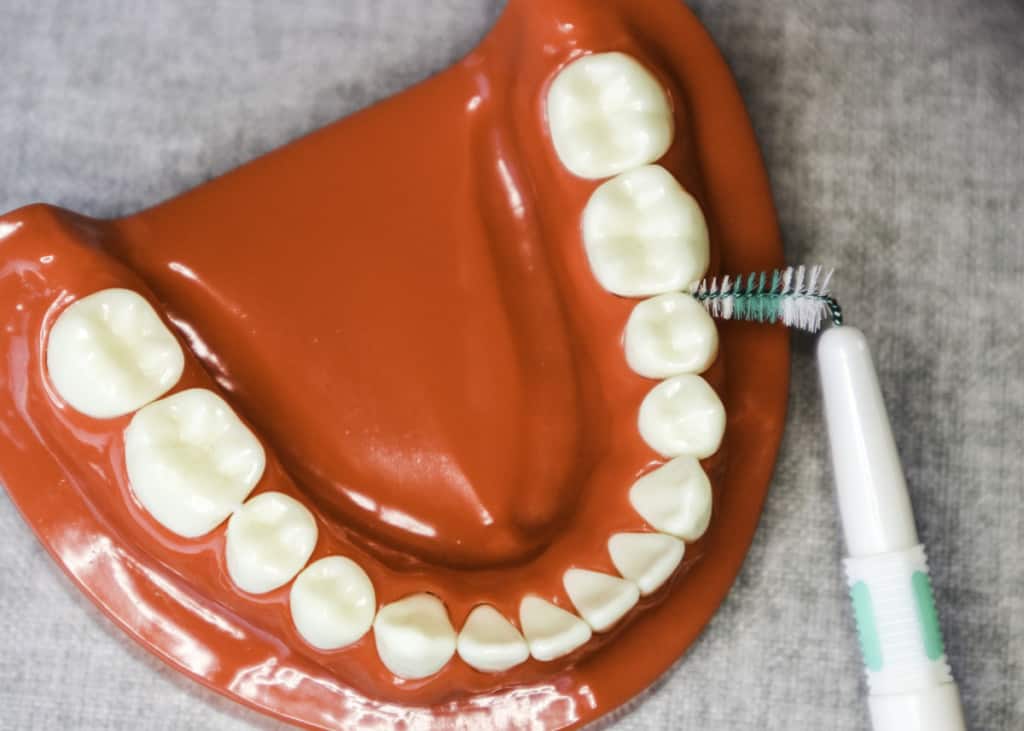
3. Use interdental brushes, floss and brush
Use floss/interdental brushes at least 3-4 times a week and brush 2 x a day. Interdental brushes are underrated and a fantastic additive to an oral hygiene routine. The bristles can clean in the grooves of the roots, where floss does not reach, disrupting the biofilm on the teeth and gums.
Read Now: What Happens if You Never Floss? Dental Hygienist Explains!
4. Avoid irritants in toothpaste, such as SLS (sodium lauryl sulphate), if toothpaste irritates the gum tissue.
Different additives can irritate the soft tissue and lead to tissue loss. If your tissue becomes irritated, look for SLS in the ingredient list, as you may want to switch to toothpaste without it.
Read Now: Tissue in Your Mouth Peeling? Causes and How to Stop It.
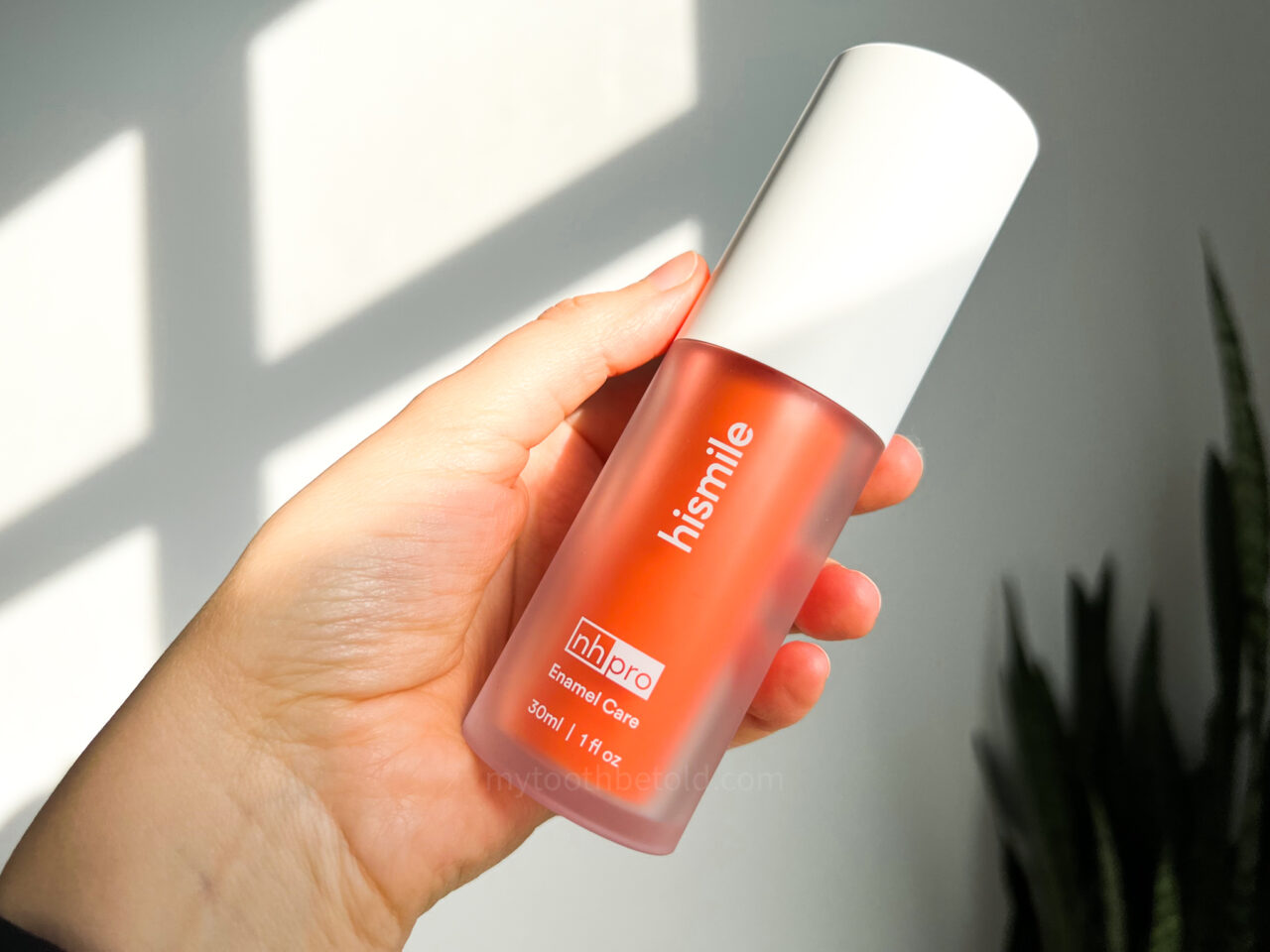
5. Use a remineralizing agent on your teeth (fluoride or nano-hydroxy appetite)
Teeth can become more sensitive if areas of the tooth have demineralized. Demineralization is the first stage in cavity formation, but the tooth can be remineralized and strengthened again. However, if enough tooth structure has been lost, a filling will need to be done to remove the tooth decay and seal the tooth to prevent it from further destruction.
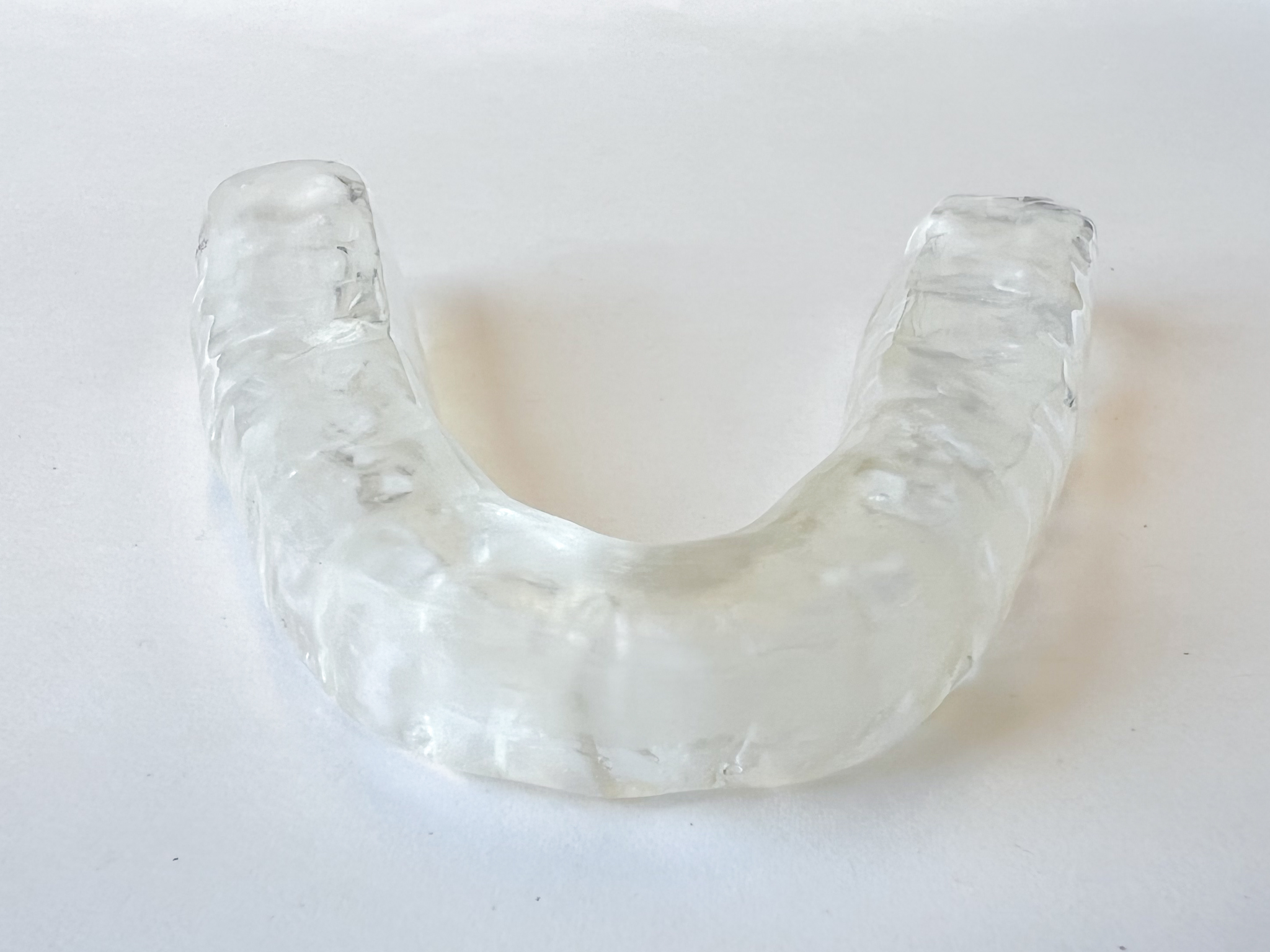
6. Wear a nightguard if you clench or grind your teeth
If you are clenching and grinding (your dental professional may see signs in your mouth that you are doing this), wear a dental nightguard made by the dental office (do not buy over-the-counter), as it is vital to have your bite checked to make sure the force is distributed evenly.
7. Get braces/orthodontic treatment; the earlier, the better
Completing orthodontic treatment ensures a proper bite to make oral hygiene more manageable and even out biting forces. If the force of eating or even clenching and grinding is more focused on a couple of teeth, they are more likely to wear down and cause recession or gum disease, increasing the risk of tooth sensitivity later on in life.
Read Now: Cosmetic or Medical? Reasons Why Dental Braces Are Needed
8. Use an electric toothbrush with a pressure sensor and soft bristles
Some people have a really enthusiastic way of brushing their teeth which can lead to too much pressure being put on the teeth. Or some people are too gentle, which results in ineffective cleaning.
Use an electric toothbrush with a pressure sensor that will tell you both when you are brushing too gently and too hard to encourage you to get the optimal pressure for the best clean.
The Oral-B iO shows a green light when brushing with the correct pressure. I think it is the best electric toothbrush on the market. Even Sonicare does not have that feature.
9. NEVER use whitening toothpaste
Whitening toothpaste does not whiten teeth. Rather it abrades away the surface stain. It can be safe to use in short-term increments on a normal tooth surface, but the real issue comes when our mouths are acidic, and we use whitening toothpaste.
Suppose you brush your teeth within 30 minutes of eating and drinking. In that case, the tooth structure is softened, so if you use a more abrasive toothpaste, you will wear away your tooth surface, possibly increasing tooth sensitivity.
I don’t recommend whitening toothpaste to my patients unless they accumulate surface stains; even at that, I don’t recommend using it long-term.
10. Avoid dry mouth, and if you have dry mouth, treat it
A dry mouth can increase tooth decay and gum disease, increasing tooth sensitivity.
If you have a dry mouth, use products that can increase saliva production or lubricate the mouth, such as xylitol or mouth lubrication gels.
Below is a linked page I wrote with the products I recommend to my patients with dry mouths (and I have used them myself), and it lists all the different products in case you don’t like gum or mints.
Read Now: Dry Mouth Dental Must-Haves
11. Don’t use tobacco/nicotine products
Tobacco and nicotine products can increase gum disease progression and induce tissue death resulting in receding gums.
Below is a link to a post I wrote about the dangers of nicotine pouches and oral health. I explain in detail changes that can occur in the tissue from the cellular level and also what happens that we can see with our naked eye.
Read Now: Hygienist Explains: ZYN Nicotine Pouches Bad For Your Gums?
12. Don’t chew ice
Chewing ice is unhealthy for the teeth because it is so hard and puts excess force on the teeth. Ice chewing can lead to fractures, chips and cracks in the tooth, leading to sensitivity.
Multiple things can cause tooth sensitivity, so it is essential to differentiate the cause. Causes of tooth sensitivity can be either internal or external.
What causes tooth sensitivity?
Tooth sensitivity is caused by the tooth’s nerve stimulation from dentin exposure or enamel erosion caused by acid wear, clenching and grinding, gum disease, over-brushing, microfractures, nerve irritation from recent dental work or cleaning, physical touch, and chemical and temperature stimuli.
I have seen information that says that tooth sensitivity as a whole is also called dentin hypersensitivity, which is incorrect.
Tooth sensitivity can have multiple causes, which include dentin hypersensitivity. Sometimes tooth sensitivity comes from inflammation of the pulp chamber (nerves and blood vessels) inside the tooth and not just from more exposed dentin.
Below I go into more depth about the different causes of tooth sensitivity. I like to explain to my patients that there are many causes of tooth sensitivity.
Although preventing tooth sensitivity is necessary, we cannot just blanket treat the sensitive tooth with sensitive toothpaste. We need to get down to the root cause (pun intended), where, why, and how the sensitivity originates.
Some issues cannot be resolved, and other treatments need to be done to treat the tooth and maintain oral health. Again, this is why a comprehensive exam by a dental professional is necessary.
Internal causes of tooth sensitivity
Internal causes of tooth sensitivity can be more complex than we initially think. Tooth sensitivity that originates or is caused by the tooth itself (not an outside stimulus such as cold water) can range from infections, and teeth whitening, to low maxillary sinuses.
Internal causes of tooth sensitivity come from an issue with the tooth’s nerve, which becomes hypersensitive or inflamed.
1. tooth decay
2. recent dental work
3. clenching and grinding
4. microfracture in the tooth
5. dying nerve of the tooth
6. abscess
7. inflammation of the gum tissue
8. teeth whitening
9. low sinuses
External causes (stimuli) of tooth sensitivity
There has to be a stimulus that triggers the nerve of the tooth to send the pain signal to the brain, which results in us feeling tooth sensitivity.
External causes include;
- physical touch
- toothbrushing, flossing, utensils, dental instruments, denture clasps
- chemical
- sugary, acidic, sour food and drink, carbonated beverages, acid from the stomach
- temperature
- cold, hot, rapid change in temperature
Pain from tooth sensitivity should be sharp and short and happen quickly after the stimulus has come into contact with the teeth.
I have a patient who has such a sensitive tooth when I am scaling (cleaning) her teeth that, we need to freeze the area and tooth with a local anesthetic. The tooth does not bother her at any other time; it is just the one tooth, as no other tooth in her mouth is sensitive during scaling. Sometimes, only one stimulus causes sensitivity, or everything affects the tooth.
Below is a handout I got from Sensodyne that briefly explains the different types of toothpaste they sell and their respective uses.
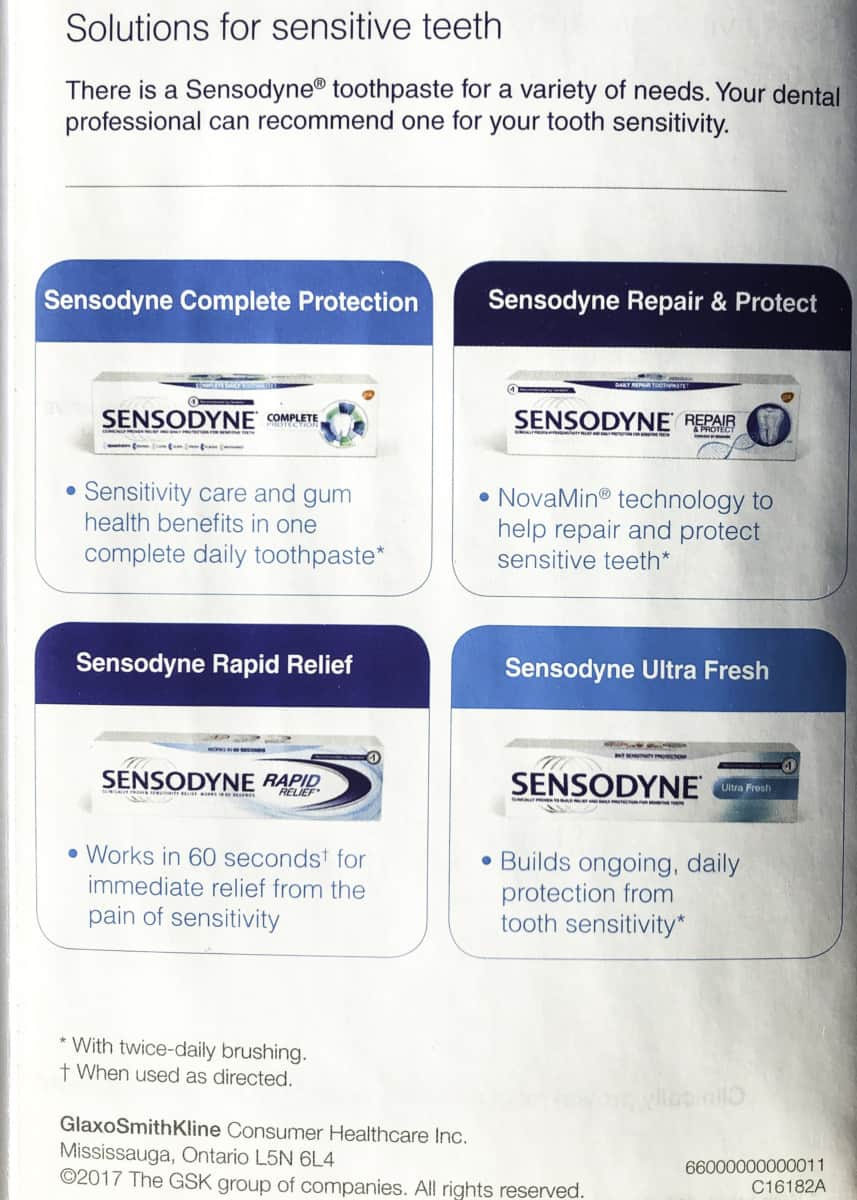
Does clove oil help sensitive teeth?
I have seen recommendations for clove oil to be used for sensitive teeth. Still, I think people are confusing tooth sensitivity related to dentin hypersensitivity and other more serious causes like tissue inflammation or cavities. Clove oil will not help with tooth sensitivity from dentin hypersensitivity.
Read the post I wrote that I linked below to learn more about clove oil in dentistry and why you shouldn’t use it in your mouth.
Read Now: Does Clove Oil Help Sensitive Teeth? Hygienist Explains
Does salt water help with sensitive teeth?
Salt water does not help or improve the symptoms of sensitive teeth.
The primary purpose of using salt in the mouth is to help the tissue heal if you have undergone dental surgery, have an ulcer or canker sore or have an infection you are being treated for.
Do not brush teeth with salt, as using salt on the teeth acts an an abrasive and can lead to more tooth sensitiviy because it will abrade away the tooth surface, allowing the dentin to be closer to the outside of the tooth an possibly more hypersensitive.
For more information on salt water rinses, I wrote a post that is linked below on what to use it for, including the recipe to get the optimal concentration to get the best efficacy.
Read Now: Salt Water Mouth Rinse Recipe for Surgery, Ulcers, Infections
Can teeth become less sensitive over time with no treatment?
After our teeth erupt into our mouths, they aren’t done changing and adapting. Even though the enamel cannot change, the structures underneath the enamel can.
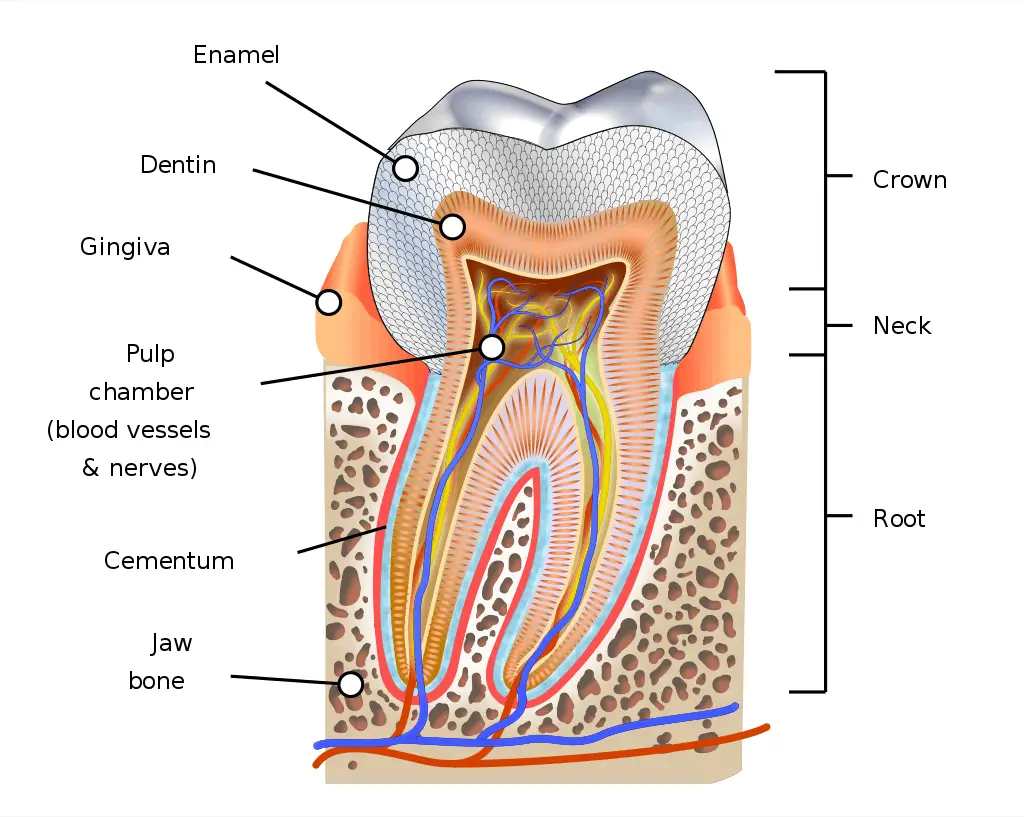
Dentin, the softer layer underneath the enamel, acts as a cushion to support the enamel and absorbs forces. If you look at dentin under a microscope, you will see tiny holes. These small holes are called dentin tubules. The dentin tubules run from the middle of the tooth, where the pulp (blood and nerves) are, to the outer edge of the dentin, closer to the outside of the teeth.
The dentin tubules provide a microscopic channel to the inside of the tooth where the nerves are, which increases tooth sensitivity.
Over time, minerals can deposit within these tubules and close off or shrink this channel to the nerves, resulting in reduced sensitivity.
Also, secondary dentin forms over our lifetime very slowly, which means the amount of dentin grows and extends and shrinks the pulp chamber. So as we age, our teeth become more resistant to sensitivity.
I hope you have found this information informative!
Have a great day,
Holly 🙂
